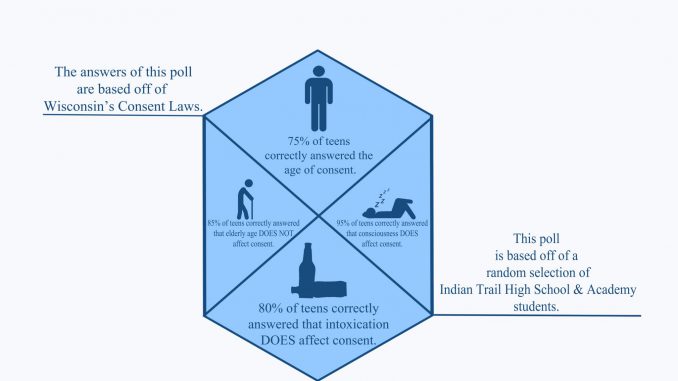
Audio summary voiced by Charlie Pohlson, Staff Writer

Written by Sam Reeves, Social Media Director/Webmaster

Over the last two years, events such as the #MeTooMovement and the confirmation hearings of US Supreme Court Justice Brett Kavanaugh have riled up America, bringing an important topic to the forefront of the population’s discus- sions.
That topic is consent.
“A lot of people have different opinions on what it means, but I think you both have to say yes and that’s consent,” said Sarah Plutchak, an Indian Trail Medical Sciences Academy junior.
People have their own views of what it means. Consent is often treated as a black and white subject, but that isn’t the reality. There appear to be a lot of gray areas, health educators say.
So where should education on consent start? How do teens tackle the confusion? Consent laws differ from state to state as each state has its own ways of defining consent and how specific situations are defined. For example, the state of Wisconsin’s law defines the age of consent as 18 years old, while the state of Alabama defines it as 16 years old.
“Personally, we don’t define the state laws, but we do teach them about sex crimes and what they mean,” said Aaron Boyd, an Indian Trail physical education and health teacher.
In a random Pulse poll of students on the topic of consent, 75 percent of teens were able to correctly identify the age of consent in Wisconsin. Furthermore, 80 percent correctly answered whether intoxication affects ability to consent; Wisconsin state law states that intoxication does affect ability to consent to intimacy.
While Indian Trail health teachers do not teach specific state consent laws, the school’s health courses do cover consent and safety during intimacy.
“I think by just discussing consent in general and letting them know about sex crimes, hopefully that covers the topic enough,” said Boyd. “We discuss consent and the importance of it. An important point I like to bring up is that just because somebody consents to intimacy once, doesn’t automatically mean they are consenting to it again in the future.”
Instead of drilling rules into students’ heads, Indian Trail’s health classes aim to give students resources so they are able to educate and look into questions themselves.
“Our system educates them on resources they can use in the future. Students need to take the responsibility to learn the information and use it to their benefit,” said Boyd, “Some students may be sexually active — and they need to know their rights, and what’s correct, and they shouldn’t be pressured into doing something they aren’t ready to do or aren’t willing to do.”
Several Indian Trail teens recently talked about some of the assumptions that go with the concept of consent.
“You would think it’s common sense — that like if someone was intoxicated or not in the right state of mind, that you should know better.” says Mona Fahad, a Med-Sci senior
Others spoke about lesser discussed issues pertaining to the subject.
“I mean, usually the woman is supposed to decide, not the guy,” say Edelmar Morales-Rivera, a Med-Sci senior.
Male students also discussed how it appears that not a lot of people talk about how it is just as important for the male to give consent as well as the female.
“Boys can be victims of this stuff (sexual crimes) as well,” says Robert Holden, a Communications Academy senior.
Teens also shared what they wished adults would talk about more when it comes to consent.
“I just want it to be talked about, period. I don’t know about this school, but I took health online and they didn’t discuss it at all,” says Plutchak.
“Explain that just because they’re in a position of power, that doesn’t affect your ability to say no to them,” says Holden. “People will almost definitely try to use their position against you, and you are allowed to say no.”
